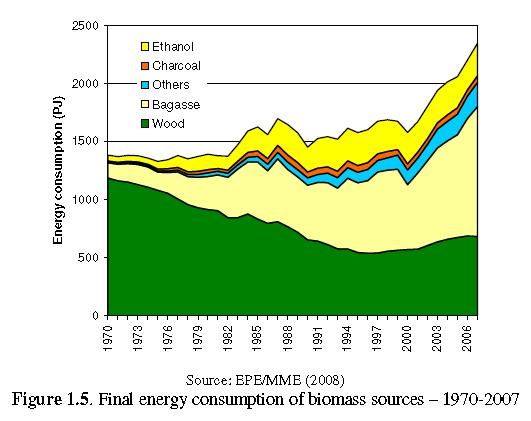Few countries rival Brazil in terms of biomass energy potential. The country has the second largest forested land area, behind only Russia. Because of this, and due to the nation’s favorable climate and topography for agriculture, nearly thirty percent of Brazil’s energy is derived from biomass sources. Sugar has long been converted into ethanol with its by-product, bagasse, then used to make steam and electricity, largely for industrial purposes. More recently, oil seeds such as soybeans have been used to make biodiesel. Increasingly complementing these in Brazil is another promising fuel source, highlighted in an International Energy Agency report released this year: eucalypts.
Eucalypts (a term inclusive of several genera, one being Eucalyptus) are fast growing woody plants that are non-native to Brazil’s ecosystem. The amount of plantation land dedicated to its growth has doubled in only the last five years to total 6.3 million hectares. Growers have found a number of advantages in the cultivation of eucalypts:
- Utilization of eucalypt plantations reduces the exploitation of native forests.
- Short-rotation eucalypt plantations do not adversely affect local hydrology or water production.
- The plant’s water and nutritional requirements are similar to, while more efficient than, native Brazilian forest and agricultural crops; thus, greater biomass production per unit of intake.
- Eucalypt plantations protect against soil erosion and contribute to biodiversity by sheltering wildlife.
- Short-rotation periods ensure sustainability; harvesting periods reduced to five or six year cycles.
In the past, the main biomass energy-related role of eucalypts was to create charcoal, which was then substituted for coking coal in the processing of metals. However the advantageous characteristics of the plant have expanded its use in industry. Eucalypts are being planted by sugar plantations and by pulp and paper companies for the generation of electricity. The plant is even slated for conversion into pellets for export. For this purpose, Suzano Energia Renovável—a subsidiary of a Brazilian pulp and paper company—has acquired eucalypt plantations to supply two one million ton pellet plants in Northeastern Brazil. Just this month the company signed a letter of intent valued at USD 536 million for the facilities’ construction with the intention to export to the European market upon completion. Suzano Energia Renovável’s massive pellet plants are expected to be operational by 2014.
Given its remarkable potential, eucalypts may become yet another pillar in Brazil’s diverse biomass energy mix.

